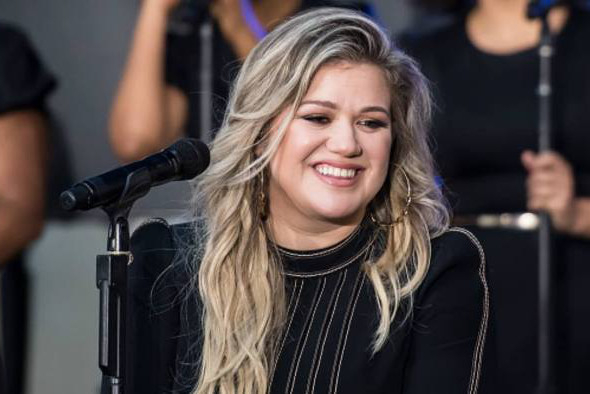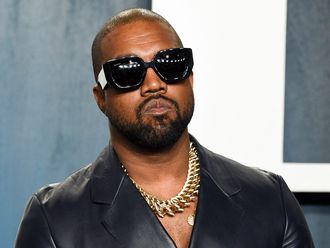
There were more than 200 radio programmers milling around the back of Kelly Clarkson’s stately lakeside home on a recent Thursday evening in Tennessee, sipping drinks named after songs from her forthcoming album and snapping selfies near the twin winding staircases leading to her pool. Clarkson and her husband, Brandon Blackstock, who is also her manager, were introducing the record, titled Meaning of Life, to the people who could either help make it a blockbuster or bury it.
After the giddy crowd filed into a tent, Clarkson made a low-key entrance in a black dress and a full face of glam, gripping a glass of red wine. She greeted the crowd warmly, then started announcing songs with an uproarious, profanity-laced monologue that covered her voluminous hair extensions, Spanx and admiration for the pop star Pink (“If I did want to like a girl, it would be her”). In a corner, members of Clarkson’s label team weren’t huddled together, cringing — they were grinning and applauding.
“Kelly doesn’t try to be anything she isn’t,” Julie Greenwald, the chairwoman and chief operating officer of Clarkson’s record label, Atlantic, said later.
There are pop stars with no filter, and then there is Clarkson, a music-industry unicorn. After winning the first season of American Idol in 2002 when it was just an untested reality-singing curiosity, she became one of the show’s few discoveries with staying power. She has collected three Grammy Awards, notched 11 Top 10 singles and sold nearly 18 million copies of the seven albums she released on RCA Records, her previous label, according to Nielsen Music. It is impossible to make it through a night of karaoke without hearing someone grasp for the high notes of her quintessential kiss-off anthem, Since U Been Gone.
But perhaps more remarkable, Clarkson, 35, has remained a major pop player for a decade and a half without checking the usual pop-star boxes. She’s not an enigmatic, larger-than-life figure like Beyonce, or a social-media chess master like Taylor Swift; she’s not an outsize persona like Lady Gaga or a style icon like Gwen Stefani. She’s not known for dancing, splashy tabloid drama or sparring with other stars — though she’ll shut down body shamers and anyone who spews negativity at her on Twitter. Like Adele, she is known for her tremendous voice, the vulnerability and relatability of her songs and her fearlessness when it comes to speaking her mind.
“I don’t want to be trained to talk,” Clarkson said in an unsurprisingly blunt interview the day after her radio soiree. “I’m not a puppet; I have a brain.” Soon she will bring her frankness back to television, as a coach on The Voice in 2018.
Clarkson is hoping Meaning of Life, out now, speaks loudly, too. After finishing her RCA contract, which came with her Idol victory and was an unhappy partnership she refers to as her “arranged marriage,” she is making what she considers her first real artistic statement. Leaving behind the pop-rock that became her signature sound in favour of the soul that has captivated her since her youth in Texas, she is asking her audience to leap with her into more mature, nuanced sonic and emotional territory.
The album’s first single, Love So Soft, sets the tone — it’s a swaggering track packed with girl-gang backup vocals and horn blasts that climaxes with a blistering high note. It sends a clear message: The Diva Is Present. For the first time in 15 years, Clarkson feels as if she is driving her own career. If she fails — and she recognises the risks — at least she crashes on her own terms.
While contemporary soul singers have penetrated the pop market in recent years, “It definitely is still a harder sell than Since U Been Gone 2.0. It’s not the easiest route,” she said. “But it’s the only option.”
Chatting in a library just off the front parlour, Clarkson said she appreciated the hard work that went into her career at RCA (“We were successful and you’ve got to give credit to where it’s due”). But she knew almost immediately that it wasn’t a good fit.
“I did call my mum at some point, and I was just like, you know what, this is just not fun,” she said. “I had fun waitressing. I had fun being a promo girl for Red Bull. I had fun working at Papa John’s. And this is my dream, and this is not fun.” This was in 2003.
She felt like nobody listened to her or respected her creative input, and she had a well-publicised disagreement with Clive Davis, then the head of the RCA Music Group, over the direction of her 2007 album, My December, which flared up again upon the release of his memoir in 2013. She compromised repeatedly, she said, but pushed back when she needed to and stands behind her work. “I gave it my best on every record that I had to put out because I’m singing these songs for the rest of my life,” she said. RCA declined to comment.
While on vacation in Ireland years before her contract was up, Clarkson made a connection with John Esposito, the head of Warner Music Nashville, and was struck by his passion when he sang Bruce Springsteen songs at a group dinner. (“I was like, oh my God, a record executive loves music. I had never experienced that,” she said dryly.) When she was ready to make a move, Esposito, who works with Blake Shelton — one of her husband’s management clients — suggested she meet with Greenwald and Craig Kallman, who run Atlantic, the home of Ed Sheeran and Bruno Mars. Clarkson was smitten after just one meeting.
“I’m not that person that feels you need to date a lot — if you find someone you love, go with it,” she said. The feeling is mutual.
“She is arguably one of the best female vocalists out there, period,” Greenwald said in a phone interview. “And if you look at the charts right now and the stuff that’s on radio, there aren’t that many women out there with big voices. You can count on one hand.”
Showcasing that voice in its full glory was one of Clarkson’s primary objectives for Meaning of Life. “I wanted to make a record that I could really sing the [expletive] out of,” she said. Writing songs wasn’t as big of a priority; she wanted to spend time with her children, and “I don’t write well when I’m happy.”
Her starting point was her favourite artist: Aretha Franklin. She and Kallman, who was an executive producer of Meaning of Life with Clarkson, asked, “What if Aretha was born now and made a record today?”
They didn’t want the album to sound old. “So it’s just not nostalgic, it’s not a retro experience,” Kallman said in a phone interview, “but it’s really a modern experience infused with the best of those records we call standards.”
She understands why fans feel an extra sense of ownership over her. We witnessed her Idol journey in real time. We heard the personal stories she shared in songs like Because of You and Piece by Piece, which describe feeling abandoned by her father following her parents’ divorce. We’ve seen her transparency and graciousness in an ecosystem that encourages the opposite.
“I actually don’t mind that,” she said, “because I feel a certain level of pride that people even feel like my journey is that important in their life. That’s cool, for someone from Nowhereville. I just mind when people all of a sudden feel like I’m one thing.”
Over the summer, Clarkson shined a light on the routine harassment women endure online by responding to a “You’re fat” tweet with “... and still [expletive] awesome.” (She added a winking-tongue-out emoji, perhaps because, as a therapist told her during one of the two sessions she’s ever had, “You don’t want to wreck someone’s day.”) And she has no patience for being instructed to “shut up and sing.”
“It’s weird, but I actually came with a brain, not just vocal cords, and it would be silly to not have an opinion,” she said, growing heated. “It would be a disgrace if I didn’t have an opinion. It would be a cruel irony to all these people who live in different countries who don’t have an opinion, and don’t count, for me not to take full advantage of all the opportunities that are laid before us here in this nation.”
The centrepiece of Meaning of Life is a feisty throwdown called Whole Lotta Woman, which alludes to the size of her waistline, her attitude, her self-worth and her mouth using references to Southern cooking. Clarkson said its inspiration came from the challenges of being a financially secure woman looking for a man after internalising the paradoxes of growing up in the South, where women are told, “We want to educate you and we want you to be intelligent, but not too intelligent to where you’re intimidating; we want you to be beautiful, but not too sexy... we want you to be successful but not so successful that you make someone feel uncomfortable.”
Debuting the track for the radio promoters at her home, Clarkson couldn’t hold back. She sung along and bounced to its outro’s bass-heavy groove.
“I don’t want to hide the fact that I am a successful, strong-minded, opinionated,” she said the next day, cutting herself off to make another point. “Sometimes I get it wrong, but I learn — but I have a voice.”












